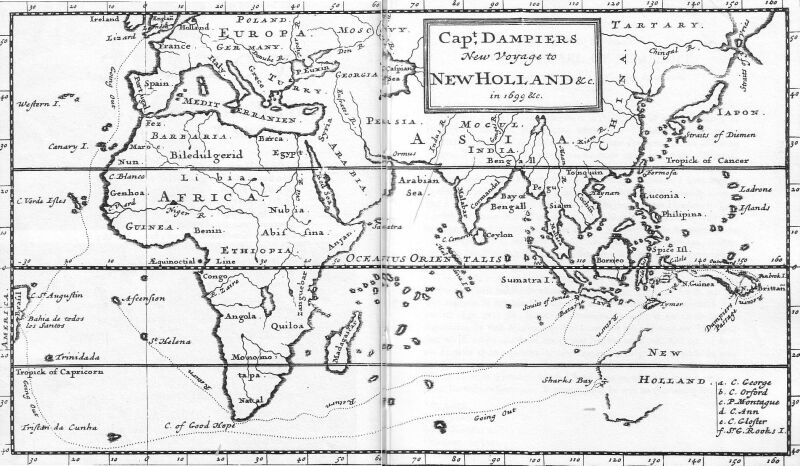dv said:
William Dampier is probably mostly famous in Australia for the fact that he led the first British exploration of the Australian mainland. The Australian coasts he charted had already been mapped by Dutch explorers but his party did make valuable discoveries. He circumnavigated the globe three times, visiting much of Asia and the Americas. He led a varied life as a seaman in the Royal navy, a pirate, a contracted privateer and navigator.
What you might not know is that he played a significant role in bringing new words into the English language.
The Oxford English dictionary credits Dampier with the first English use of 81 words, including avocado, chopsticks, barbecue, and tortilla. He additionally is cited by the OED as the first to use speaking meanings of 268 previously existing words. All up the OED quotes him over 1100 times. One work alone, A New Voyage Around The World, is cited 677 times.
Three times. Didn’t know that. Third Englishman to visit Australia, but much more significant than the first two, Keeling and ?Brooke?
> One work alone, A New Voyage Around The World, is cited 677 times.
I must read it. That’s the first circumnavigation isn’t it. Not in Gutenberg. But his second book is there, in two parts. “A voyage to New Holland”.
https://www.gutenberg.org/ebooks/15675
https://www.gutenberg.org/ebooks/15685
It begins. “Wherein are described, The Canary Islands, the Isles of Mayo and St. Jago. The Bay of All-Saints, with the forts and town of Bahia in Brazil. Cape Salvador. The winds on the Brazilian coast. Abrolho Shoals. A table of all the variations observed in this voyage. Occurrences near the Cape of Good Hope. The course to New Holland. Shark’s Bay. The isles and coast, etc. of New Holland. Their inhabitants, manners, customs, trade, etc. Their harbours, soil, beasts, birds, fish, etc. Trees, plants, fruits, etc.”

Some random quotes from part 1.
“Of the country about Bahia, its soil and product. Its timber-trees; the sapiera, vermiatico, commesserie, guitteba, serrie, and mangroves. The bastard-coco, its nuts and cables; and the silk-cotton-trees. The Brazilian fruits, oranges, etc. Of the soursops, cashews and jennipahs.
Of their peculiar fruits, arisahs, mericasahs, petangos, petumbos, mungaroos, muckishaws, ingwas, otees, and musteran-de-ovas. Of the palmberries, physick-nuts, mendibees, etc. and their roots and herbs, etc. Of their wildfowl, macaws, parrots, etc. The yemma, carrion-crow and chattering-crow, bill-bird, curreso, turtledove and wild pigeons; the jenetee, clocking-hen, crab-catcher, galden, and black heron: the ducks, widgeon and teal; and ostriches to the southward, and of the dunghill-fowls. Of their cattle, horses, etc. Leopards and tigers. Of their serpents; the rattlesnake, small green snake. Amphisbaena, small black and small grey snake; the great land-, and the great watersnake; and of the water-dog. Of their sea-fish and turtle;
Jennipah never made it into English. Ditto arisah, mericasah, petango, petumbo, mungaroo, muckishaw, etc.
Amphisbaena.



